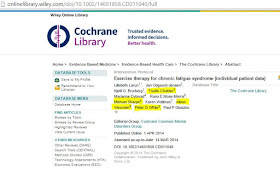OCTOBER 28, 2015
expert reaction to long-term follow-up study from the PACE trial on rehabilitative treatments for CFS/ME, and accompanying comment piece
A paper published in The Lancet Psychiatry reports results of a long-term follow-up study to the PACE trial for CFS/ME. The study has assessed the original trial participants’ health in the long-term, and asks whether their current state of health, two and a half years after entering the trial, has been affected by which treatment they received in the trial. These comments accompanied a briefing.
Prof. Rona Moss-Morris, Professor of Psychology as Applied to Medicine, King’s College London, said:
“I think this is a robust study with some limitations that the authors have been clear about. The original PACE trial published in 2011 showed that at one year people with CFS/ME who received either graded exercise therapy (GET) or cognitive behavioural therapy (CBT) in addition to standard medical care were significantly less fatigued than those who received standard care alone or those who received adapted pacing therapy. The authors concluded GET and CBT were moderately effective treatments for CFS. Now, moderately effective may not sound all that impressive until you consider that many of our commonly used pharmaceuticals for medical conditions have similar moderate treatment effects. When using pharmaceuticals as treatment, maintaining these effects may mean taking ongoing medicines. This study shows that even two years or more after treatment has completed, patients receiving GET and CBT sustain their clinical benefits. A small percentage of these patients accessed some further treatment, but even so, these sustained effects are impressive.
“Despite these impressive results, this isn’t time for complacency. Some patients do not benefit from the treatment. We need to do more to understand why. We also need to develop and tailor existing treatment to get larger effects. It is also important to note that the CBT and GET protocols used in PACE were developed specifically for CFS. They are not the same as CBT for depression and anxiety or the exercise training you may receive at a local gym. The therapies are based on a biopsychosocial understanding of CFS and the health care professionals in PACE received specific training and supervision in these approaches. This is an important note for commissioners as not all CBT and exercise therapies are equal. Specialist knowledge and competence in these therapies is needed to obtain these sustained treatment effects.”
‘Rehabilitative treatments for chronic fatigue syndrome: long-term follow-up from the PACE trial’ by Michael Sharpe et al. published in the Lancet Psychiatry on Wednesday 28 October 2015.
‘Chronic fatigue syndrome: what is it and how to treat?’ by Steven Moylan et al. published in the Lancet Psychiatry on Wednesday 28 October 2015.
Declared interests
Prof. Rona Moss-Morris: “Two authors of this study, Trudie Chalder and Kimberley Goldsmith, are colleagues of mine at King’s College London. I work with Trudie on other CFS work and with Kimberley on different work. I published a small study on GET in 2005. I am a National Advisor for NHS England for improving access to psychological therapies for long-term conditions and medically unexplained symptoms. Peter White (another author of the present study) is Chair of trial steering committee for an HTA NIHR-funded RCT I am working on with people with irritable bowel syndrome.”















